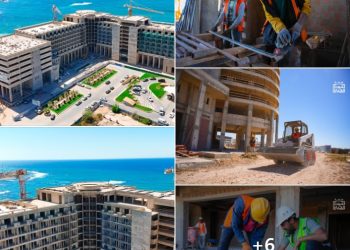By Abdul Salam Nasiyah.
Several initiatives have been presented to resolve the Libyan crisis, in particular the proposal to hold presidential and parliamentary elections. Such initiatives and proposals have been presented either by members of the House of Representatives, or in the meeting of Abu Dhabi [between the President of the Presidential Council for the Government of National Accord Faiez Serrah and the commander general of the Libyan Armed Forces Khalifa Hafter], or through the letter of the President of the Libyan House of Representatives [Ageela Saleh] to the High National Elections Commission (HNEC), and finally through the speech of the President of the Presidential Council for the Government of National Accord.
Most of these initiatives did not clarify the legislative basis for these elections due to the complexity of the legal and legislative status of the current bodies. The elections need a legislative framework that deals with the current situation and is based on a clear legislative framework. To achieve this target, it is imperative to know the current status quo, the requirements of the elections, the supervising parties, the guarantees for the implementation of the results of the elections, as well as the timing of holding such elections.
Data of the Current Situation:
- The nine-times amended Constitutional Declaration, the most important of which is the Seventh Amendment that includes the February Committee proposals that stipulate the separation of powers and the election of the head of state. This Constitutional Declaration, particularly the February Committee proposals, has raised a serious question regarding the ruling of the Supreme Constitutional Court on its unconstitutionality;
- The Skhirat Libyan Political Agreement, signed almost a year and a half ago, was not included in the Constitutional Declaration and is opposed by a part of the Libyan people. It has produced bodies that have become part of the conflict and their legitimacy has been challenged. There is almost unanimous agreement on the need to amend this political agreement;
- The Constitution Drafting Assembly (CDA) is suffering from multiple divisions and difficulties. It submitted a draft constitution to the House of Representatives in accordance with the Constitutional Declaration. The draft constitution was returned to the CDA due to the existence of a judicial ruling with regard to the voting procedures. A level of consensus was reached among the members of the CDA and a new draft constitution was produced. However, the CDA could not vote on it because it lacked the required quorum;
- A House of Representatives that is fragile, divided and unable to convene;
- A High Council of State with questionable legitimacy since the Constitutional Declaration has not yet been amended;
- A divided Presidential Council that has become part of the political conflict rather than the product of a political agreement;
- Rampant institutional divisions, especially in the extremely important financial and economic institutions;
- The existence of three governments, all of which claim legitimacy and operate in a particular geographical area;
- The lack of control, on land, sea, or air, by any of the rival three governments.
Prerequisites for the Elections
- Legislative basis for holding these elections: this requires determining the legislative framework. Among the options available are: amending the Constitution of 1951; amending the Constitution of 1963; the February Committee Proposals; amending the Skhirat Libyan Political Agreement and including it in the Constitutional Declaration; as well as the available draft constitution issued by the CDA;
- The election bill: this requires identifying the parties that will submit this law to be approved by the House of Representatives;
- Addressing the current situation until the election day.
The Parties involved:
- The Libyan House of Representatives;
- The Libyan House of Representatives with the High Council of State in its current status under the supervision of the United Nations;
- The Libyan House of Representatives with the High Council of State after its expansion to include those elected on 7 July 2012, under the supervision of the United Nations;
- An independent committee of law experts nominated by all parties with the oversight of the United Nations;
- A committee of all parties under the supervision of the United Nations.
The Guarantors:
The United Nations, the Arab League, the African Union and the neighbouring countries pledging to stand against any rejection of the results of the elections and to consider any party that refuses such results as an impeder to the building of the Libyan state.
Election Dates:
- 1 December 2017;
- 2 February 2018.
Summary
Through the aforementioned, I think that the best scenario for the solution through the elections is as follows:
- The House of Representatives activates the Proposals of the February Committee which have already been approved by the former General National Congress;
- Parliamentary elections’ bill shall be approved by the same law through which the House of Representatives was elected, and in the same electoral constituencies;
- Approving a law for the presidential elections;
- Elections shall be held in December 2017 under the supervision of the United Nations, the Arab League, and the African Union;
- The United Nations, the Arab League, and the African Union pledge to stand against any rejection of the results of the elections.
Dr Abdul Salam Nasiyah is a member of the House of Representatives for Zintan. He was previously one of Zintan’s two members of the General National Congress. He currently chairs the HoR’s Dialogue Committee.
Views expressed in Op-Ed or Opinion articles do not necessarily reflect the view of the Libya Herald







